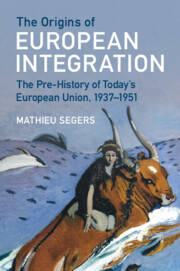In The Seventh Member State, I show that imperial concerns were central to the original shape of the European Communities, in particular French anxieties about Algeria. The latter had been imagined by several generations of French as an extension of the metropole across the Mediterranean, while at the same time a majority of the population was not granted citizenship rights. While in 1951 France opted for the exclusion of Algeria from the territory of the Coal and Steel Community, in 1957 the strategy followed was the opposite, and Algeria was made part of the EEC, not least because this seemed to reinforce French claim that the territory was part of France and, perhaps above all, it rendered possible to obtain the financial support of the other five founding states for costly Algerian development projects. Labelling Algeria a seventh member state, as is done in the title of the book, calls the attention of the reader not only to the sweeping expanse of postwar European institutions, which lasted even after states such as Algeria gained independence, but also to the contestable and contested conception of Member State. Mainly intended as a piece in French history, the book illuminates the extent to which Europe was the main vehicle of the rescue of the imperial nation-state, and how white supremacy and colonial rule were maintained through a peculiar combination of the rule of law and states of emergency.
